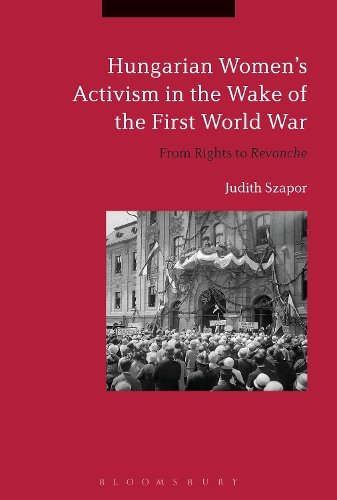
Hungarian Womens Activism in the Wake of the First World War: From Rights to Revanche
(Hardback)
Available Formats
Publishing Details
Hungarian Womens Activism in the Wake of the First World War: From Rights to Revanche
By (Author) Professor Judith Szapor
Bloomsbury Publishing PLC
Bloomsbury Academic
14th December 2017
United Kingdom
Classifications
Tertiary Education
Non Fiction
Gender studies: women and girls
Political activism / Political engagement
European history
General and world history
Political science and theory
History and Archaeology
305.4209439
Physical Properties
Hardback
224
Width 156mm, Height 234mm
472g
Description
Using a wide range of previously unpublished archival, written, and visual sources, Hungarian Womens Activism in the Wake of the First World War offers the first gendered history of the aftermath of the First World War in Hungary. The book examines womens activism during the post-war revolutions and counter-revolution. It describes the dynamic of the periods competing, liberal, Christian-conservative, socialist, radical socialist, and right-wing nationalistic womens movements and pays special attention to women activists of the Right. In this original study, Judith Szapor goes on to convincingly argue that illiberal ideas on family and gender roles, tied to the nations regeneration and tightly woven into the fabric of the interwar periods right-wing, extreme nationalistic ideology, greatly contributed to the success of Mikls Horthys regime. Furthermore the book looks at the long shadow that anti-liberal, nationalist notions of gender and family cast on Hungarian society and provides an explanation for their persistent appeal in the post-Communist era. This is an important text for anyone interested in womens history, gender history and Hungary in the 20th century.
Reviews
Szapors book is a remarkably important contribution that focuses on womens history from the golden age of liberal organizations to the madness of antisemitism. Certain elements of the books concept, as well as some of the evidence cited to support it, remain open to debate, yet the concept itself is outstandingly promising. The model also appears to be suitable for implementation in researching other forms of political transition. * Canadian Slavonic Papers *
Szapor's path-breaking book on Hungarian women's activism between world war, revolutions and counter-revolution is bursting full of new discoveries, complex personalities, compelling ideological conundrums, and the intrigue of rapid political realignments. Its interest extends well beyond the under-developed field of Hungarian women's history, offering provocative interventions into European gender history, the starkly uneven comparative history of suffrage and its aftermath, and the reclamation without celebration of women's nationalist and anti-liberal activism. * Julie Gottlieb, Reader in Modern History, University of Sheffield, UK *
This well-researched and engaging study addresses a heretofore under-analyzed topic, Hungarian womens activism in an era of war, revolution, and reaction. It is an important addition to gender/womens history in twentieth-century Eastern Europe. * Nancy M. Wingfield, Presidential Research Professor, Northern Illinois University, USA *
Author Bio
Judith Szapor is Assistant Professor of History at McGill University, Canada. She is the author of The Hungarian Pocahontas; The Life and Times of Laura Polanyi Stricker, 1882-1959 (2005) and co-editor, along with Andrea Peto, Maura Hametz and Marina Calloni, of Jewish Intellectual Women in Central Europe, 1860-2000 (2012).
